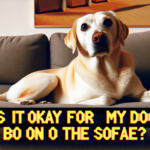Contents
Understanding Why Dogs Lick Themselves
As any dog owner knows, dogs have a tendency to lick themselves. Whether it’s a quick lick to clean a paw or a lengthy grooming session, licking is a natural behavior for dogs. But have you ever wondered why dogs lick themselves? In this article, we will explore the various reasons behind this behavior.
Cleaning and Grooming
One of the most common reasons why dogs lick themselves is for cleaning and grooming purposes. Licking helps them remove dirt, debris, and other substances from their fur. It’s their way of staying clean and maintaining good hygiene. Dogs have a unique saliva composition that contains enzymes that can help dissolve dirt and promote healing in minor wounds.
Furthermore, licking their fur helps spread their natural oils evenly, which contributes to a healthy coat. It also stimulates the production of natural oils, keeping their skin moisturized. So, the next time you catch your furry friend licking himself, remember that he’s just trying to stay clean and maintain his appearance.
Affection and Bonding
Another reason why dogs lick themselves is to show affection and strengthen the bond with their owners. Licking can be a display of love and trust from your furry companion. It’s their way of saying, “I care about you.” Dogs use their tongues to lick their owners’ hands, face, or other body parts as a sign of their affection and loyalty.
However, it’s essential to set boundaries and teach your dog what is acceptable licking behavior. Excessive licking can become a problem, leading to skin irritations or even obsessive-compulsive behavior. If your dog’s licking becomes excessive or concerning, it’s advisable to consult with a veterinarian or professional dog trainer for guidance.
Relieving Stress and Anxiety
Licking can also be a self-soothing behavior for dogs, helping them to relieve stress and anxiety. Similar to how humans may bite their nails or fidget with their hands when nervous, dogs may resort to licking as a natural way to calm themselves down.
If you notice your dog engaging in excessive licking, it could be a sign of underlying anxiety or discomfort. It’s crucial to identify the cause of their stress and find ways to address it. Providing a safe and comforting environment, engaging in regular exercise, and considering professional help if needed can all contribute to reducing your dog’s licking behavior.
Understanding why dogs lick themselves can help us better care for our furry friends and ensure their well-being. Whether it’s for cleaning and grooming, showing affection, or relieving stress, licking is a natural and instinctive behavior for dogs. As responsible dog owners, it’s essential to monitor our dog’s licking habits and intervene if necessary.
Remember, if you have any concerns about your dog’s licking behavior or if it becomes excessive, don’t hesitate to consult with a veterinarian. They will be able to provide professional advice and guidance specific to your dog’s needs. By staying informed and attentive, we can ensure our furry friends lead happy and healthy lives.
The Importance of Grooming in Dogs
Keeping Your Canine Companion Clean and Healthy
Grooming plays a vital role in maintaining the overall well-being of your furry friend. Regular grooming not only keeps your dog looking great and smelling fresh, but it also prevents various health issues. From brushing their coat to keeping their nails trimmed, grooming should be an essential part of your dog’s care routine. Here’s why grooming is important for dogs:
Maintaining a Healthy Coat
Proper grooming helps to keep your dog’s coat in top condition. Regular brushing removes dead hair and prevents matting, which can cause discomfort and skin irritation. It also stimulates the production of natural oils that keep their skin moisturized. Depending on the type of coat your dog has, they may require different types of brushes or combs. Consult with a professional groomer or your veterinarian to choose the right tools for your furry companion.
Preventing Skin Problems
Regular grooming helps to prevent various skin problems in dogs. By brushing your dog’s coat, you can easily detect any skin abnormalities, such as rashes, hot spots, or ticks. It also provides an opportunity to catch and treat any fleas or parasites that may be present. Keeping your dog’s skin clean and healthy is essential for their overall well-being.
Ensuring Proper Nail Care
Neglected nails can cause discomfort and pain for your dog. Overgrown nails can become ingrown or split, leading to infections and difficulty in walking. Regular nail trimming is a crucial part of grooming to ensure your dog’s comfort. If you are unsure about how to trim your dog’s nails properly, consult with a professional groomer or your veterinarian.
Monitoring Ear Health
Your dog’s ears can be a breeding ground for bacteria and yeast if not cleaned regularly. This can lead to ear infections and discomfort for your furry friend. During grooming sessions, make sure to clean your dog’s ears gently, removing any dirt or debris. If you notice any signs of redness, swelling, or a foul odor, consult with your veterinarian.
Promoting Dental Hygiene
Good oral hygiene is essential for your dog’s overall health. Without proper dental care, dogs can suffer from dental disease, which can lead to pain, tooth loss, and other serious health issues. Brushing your dog’s teeth regularly and providing dental chews can help keep their teeth clean and healthy. Regular grooming sessions allow you to check for any signs of dental problems and take preventive measures.
In conclusion, grooming is not only about keeping your dog looking fabulous but also about maintaining their overall health and well-being. Regular grooming sessions ensure that your furry friend’s coat is healthy, their nails are trimmed, their ears are clean, and their teeth are in good condition. If you are unsure about how to groom your dog properly, consult with a professional groomer who can guide you through the process. Remember, a well-groomed dog is a happy and healthy dog!
Possible Medical Reasons for Excessive Licking
Excessive licking in animals can be a cause for concern. While licking is a natural behavior for animals, it can become excessive and lead to potential health issues. In this article, we will explore some possible medical reasons for excessive licking in pets. It’s important to note that this article is not intended as a substitute for professional veterinary advice. If you notice your pet exhibiting excessive licking, it is always best to consult with your veterinarian.
Allergies
One common medical reason for excessive licking in animals is allergies. Just like humans, pets can be allergic to certain substances, such as food, pollen, dust, or even certain fabrics. Allergies can cause itching and discomfort, leading to excessive licking as a way to alleviate the irritation. If you suspect that your pet may have allergies, it is recommended to consult with your veterinarian to determine the cause and explore treatment options.
Skin Infections
Skin infections can also be a reason behind excessive licking. Bacterial or fungal infections can result in itchiness and discomfort, prompting pets to excessively lick the affected areas. It’s important to keep an eye out for any signs of redness, swelling, or pus on your pet’s skin, as these may be indicators of an infection. If you suspect a skin infection, it’s best to seek veterinary attention promptly to prevent it from worsening.
Pain or Discomfort
Excessive licking can also be a sign of pain or discomfort in animals. Pets may lick certain areas if they are experiencing pain, such as joint pain or gastrointestinal discomfort. It’s important to observe your pet’s behavior and look for any other signs of pain, such as limping or changes in appetite. If you suspect that your pet may be in pain, it is crucial to consult with your veterinarian to determine the underlying cause and provide appropriate treatment.
Behavioral Issues
Sometimes, excessive licking may not have a medical cause, but rather be due to behavioral issues. Pets may develop habits of excessive licking as a result of stress, anxiety, or boredom. It’s important to address these underlying behavioral issues to prevent them from causing further physical problems. Consult with a professional animal behaviorist or your veterinarian for guidance on how to manage and alleviate these behavioral issues.
Dental Problems
Dental problems can also lead to excessive licking in pets. Issues such as gum disease, dental infections, or dental abscesses can cause oral discomfort, prompting pets to lick their mouths excessively. Regular dental check-ups and cleanings are essential to maintain good oral health and prevent dental problems. If you suspect your pet may have dental issues, it is recommended to consult with your veterinarian for a proper examination and treatment plan.
Excessive licking in pets can be a sign of an underlying medical issue. Allergies, skin infections, pain or discomfort, behavioral issues, and dental problems are some possible reasons for excessive licking. It is important to monitor your pet’s behavior and seek veterinary attention if you notice any excessive or concerning licking behavior. Remember, your veterinarian is the best resource to help diagnose and treat any medical issues your pet may be facing.
Behavioral Causes of Excessive Licking in Dogs
Excessive licking in dogs can be a frustrating and puzzling behavior for many pet owners. Not only can it be annoying to constantly hear the sound of their tongue on their fur, but it may also lead to skin irritation or other health issues. In this article, we will explore the behavioral causes behind excessive licking in dogs and provide some practical solutions to help you address and manage this behavior.
Anxiety and Stress
One common behavioral cause of excessive licking in dogs is anxiety and stress. Dogs, like humans, can experience anxiety and stress due to various factors such as separation, changes in routine, or unfamiliar environments. When dogs feel anxious or stressed, they may resort to excessive licking as a way to self-soothe. If you suspect anxiety or stress is the underlying cause, it’s essential to identify and address the root of the problem.
Boredom and Lack of Stimulation
Dogs are intelligent and active animals that require mental and physical stimulation. When dogs do not receive enough mental or physical exercise, they may become bored or frustrated. Excessive licking can be a manifestation of this boredom or lack of stimulation. To help combat this behavior, ensure that your dog receives plenty of exercise, both physically and mentally. Engage in interactive play sessions, provide puzzle toys, or consider enrolling your dog in obedience or agility classes.
Medical Conditions
Sometimes, excessive licking in dogs can be a sign of an underlying medical condition. Allergies, skin infections, or pain can cause dogs to lick excessively in an attempt to alleviate discomfort. If you have ruled out behavioral causes and suspect a medical issue, it’s crucial to consult with your veterinarian. They can perform a thorough examination and recommend appropriate tests or treatments to address any potential health concerns.
Treatment and Management
Once you have identified the behavioral cause behind your dog’s excessive licking, you can begin implementing appropriate treatments and management strategies. For anxiety-related licking, consider using positive reinforcement training techniques to help your dog relax and build their confidence. Create a calm and soothing environment for them, and consider the use of natural remedies or pheromone diffusers.
To combat boredom-related licking, provide your dog with plenty of physical exercise through frequent walks, runs, or play sessions. Additionally, mental stimulation activities such as interactive toys or food puzzles can help keep their minds occupied and prevent boredom-related behaviors.
If your dog’s excessive licking is due to a medical condition, work closely with your veterinarian to develop an appropriate treatment plan. They may recommend medication, dietary changes, or specific grooming routines to address the underlying issue and alleviate the excessive licking behavior.
Understanding the behavioral causes behind excessive licking in dogs is essential for effective management and treatment. By addressing anxiety, providing ample stimulation, and consulting with your veterinarian if necessary, you can help your furry friend overcome this behavior. Remember, patience and consistency are key when working with your dog to modify their behavior. With time and proper guidance, you can help your dog lead a happier and healthier life, free from excessive licking.




